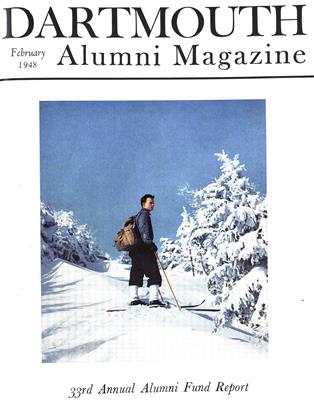by Avery Craven and Walter Johnson '37. Ginn and Cos., 1947.pp. 886, $5.00.
Only those who have taken pen in hand to tell a long and vital story in a few words and have succeeded—can appreciate what Craven and Johnson have done in this 800 page college text in American history. To have cut and pruned from the vast library of the American experience—ranging from Cheyney's European Background to Hershey's Hiroshima—is no mean task, but to have fitted the material together so that the volume has interest and coherence and vitality is an achievement of much greater distinction.
It is almost impossible tor a one-volume survey of American history to have anything really new. The authors' contribution must lie in the field of selection, approach and emphasis. These authors have not been afraid to display a definite point-of-view and their volume reflects a combination of the "liberal" spirit at home and a strong sense of America's responsibility abroad. It emphasizes the growth of democratic institutions, the contribution of immigrant groups to the emergence of a unique American culture, the increasing importance of social controls, and a growing sense of . world consciousness. One of the most interesting quotations is from August Belmont who as early as 1850 saw the day not far distant when "self-preservation will dictate to the United States the necessity of throwing her moral and physical force into the scales of European republicanism."
The volume has good illustrations and maps and a lively enough style to be attractive reading for the alumnus who wants to refresh his memory in the light of Junior's innocent questions.
 View Full Issue
View Full Issue
More From This Issue
-
 Article
ArticleATOMIC ENERGY CONTROL
February 1948 By CHESTER I. BARNARD, -
 Class Notes
Class Notes1949
February 1948 -
 Class Notes
Class Notes1918
February 1948 By ERNEST H. EARLEY, DONALD L. BARR, DAVID L. GARRATT -
 Class Notes
Class Notes1935
February 1948 By H. REGINALD BANKART JR., FREDERICK T. HALEY, ROBERT W. NARAMORE -
 Class Notes
Class Notes1931
February 1948 By A. W. LAUGHTON, WILLIAM H. SCHULDENFREI, ERNEST H. MOORE -
 Class Notes
Class Notes1924
February 1948 By JAMES T. WHITE, RICHARD A. HENRY, DONALD E. COYLE
Allen R. Foley '20.
Books
-
 Books
BooksFaculty Publications
NOVEMBER 1929 -
 Books
BooksFACULTY PUBLICATIONS
February 1942 -
 Books
BooksTHE ASTONISHED MUSE.
July 1958 By BINK NOLL -
 Books
BooksFOREIGN AID AND AMERICAN FOREIGN POLICY: A DOCUMENTARY ANALYSIS.
JANUARY 1967 By LAURENCE I. RADWAY -
 Books
BooksTHE DISPLACED PERSON'S ALMANAC.
March 1962 By NOEL PERRIN -
 Books
BooksVITAL PROBLEMS OF CATHOLIC EDUCATION IN THE UNITED
April 1940 By William F. Geiger '92.




